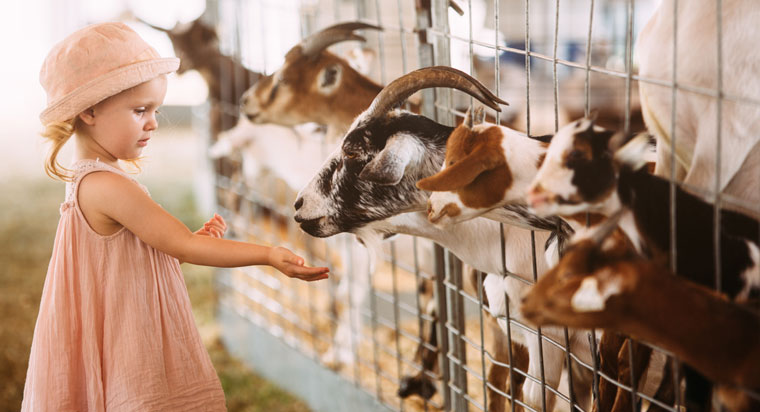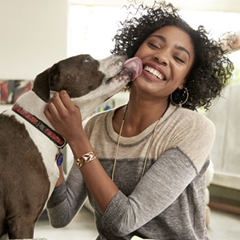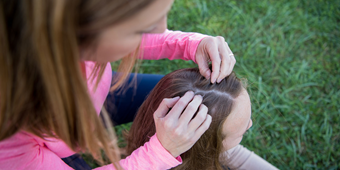Share Your Love – Not Germs – With Pets And Animals

Find Your Perfect Match
Answer a few questions and we'll provide you with a list of primary care providers that best fit your needs.
If you have a pet or a beloved farm animal, you know they take a piece of your heart and provide all kinds of feel-good benefits to our lives. Yet anytime animals and people are in close proximity, there’s the risk for germ sharing.
Zoonotic diseases are infections that spread illness between animals and people. Some are mild, like ringworm; some can be serious, such as Lyme disease and the coronavirus that originated in China. Many types of zoonosis, like rabies, have been around for hundreds of years, while others are just emerging.
Zoonotic diseases are common in the United States and around the globe, say the Centers for Disease Control and Prevention (CDC). Scientists estimate that:
- Six of every 10 (or more) known infectious diseases in people are spread from animals
- Three of every four new or emerging infectious diseases in people are spread from animals
There are easy ways, like hand washing, to keep yourself and your animals healthy. You should also learn other ways to protect the most vulnerable from getting sick.
How Germs Spread Between People And Animals

Harmful germs like viruses, bacteria, parasites, and fungi cause zoonotic diseases.
These illnesses can be transferred in different ways between people and animals. Ticks and mosquitos, dogs and cats, cows and horses can carry microscopic bacteria and viruses or large parasites such as worms and fleas.
It's not just touching an animal that can expose you to an infection, says the CDC. Infections also spread by:
- Direct contact. Touching, ingesting or breathing in the saliva, blood, urine, mucous, feces, or other body fluids of an infected animal. Examples include petting or touching animals, and bites or scratches.
- Indirect contact. Being in areas where animals live and roam, or touching objects or surfaces contaminated with germs. Examples include aquarium tank water, pet habitats, chicken coops, plants and soil, plus pet food and water dishes.
- Vector-borne bite. Being bitten by a tick, mosquito, or a flea.
- Foodborne transfer. Eating or drinking contaminated or unsafe foods. Each year, one in six Americans gets sick from unpasteurized milk, undercooked meat or eggs, or raw fruits and vegetables contaminated with animal feces.
The good news is most zoonotic conditions can be avoided with proper prevention measures and keeping your family and animals healthy.
Types Of Zoonosis
Some zoonotic conditions make animals sick, some infect people, and some affect both animals and people. Even pets and animals that appear healthy can spread disease, says the CDC.
Infections from pets include:
- Cat-scratch fever. Caused after a scratch, bite, or lick in an open wound from a cat or kitten. Symptoms: swelling and pain in the lymph nodes and loss of appetite.
- Campylobacter and cryptosporidium. Caused by handling feces from a dog, cat, or farm animal, especially one with diarrhea. Symptoms: diarrhea, cramping, stomach pain, fever, and vomiting.
- Hookworms and roundworms. Caused by ingesting tiny worms found in animal feces. Symptoms: stomach pain, bleeding, swelling, diarrhea, and sometimes painful skin irritation.
- Salmonellosis. Handling reptiles, baby chicks and ducklings, and small rodents such as hamsters and guinea pigs spreads infection. Symptoms: diarrhea, fever, and abdominal cramps.
- Toxoplasmosis. Caused by touching an infected cat, its feces, or something the cat touched. Symptoms: mild flu-like illness or no symptoms. Toxoplasmosis can be dangerous for pregnant women and those with a weak immune system.
Infections from farm and wild animals include:
- E. coli. This common infection can be caused by infected by cattle or sheep or goats in a petting zoo. Symptoms: dangerous diarrhea.
- Q Fever. Caused by ingesting infected manure or dust from areas where cattle, sheep, or goats live, or from unpasteurized milk. Symptoms: flu-like illness, diarrhea, vomiting, and chest or stomach pain. Q fever is dangerous for people with heart valve problems.
- Brucellosis. This bacterial infection spread to humans who eat unpasteurized milk or cheese, or undercooked meat from an infected animal. Hunters and animal handlers can breathe in the bacteria when handling infected meat, hides, or wool. Herd animals on the farm and in the wild can be infected. Symptoms: serious long-term illness that starts with flu-like symptoms.
- Hantavirus and lymphocytic choriomeningitis (LCMV). You can be infected by breathing in dust from rodent bedding or mouse urine and droppings, or from a mouse bite. Symptoms: can cause serious illness. LCMV is also dangerous for a pregnant woman's fetus.
- Rabies. Caused by a scratch or bite from an infected wild animal. Bats are the most common carriers of rabies. Symptoms: Rabies is nearly always fatal if not treated before symptoms appear.
Keep Your Family And Animals Healthy
Those most at risk for a zoonotic disease include:
- Children under age 5
- Pregnant women
- People with weak immune systems, including the elderly
The good news is most zoonotic conditions can be avoided with proper prevention measures and keeping your family and animals healthy.
The CDC, the Center for Food Safety and Public Health, and the District of Columbia Department of Health recommend following these tips.
To keep your family safe:
- Wash your hands often, including:
- After petting or playing with pets
- After being around pets and animals, even if you didn’t touch them
- After cleaning up litter boxers, picking up pet poop, cleaning aquariums, etc.
- Before preparing food
- Before you eat
- Wash hands properly:
- Many germs are spread by not washing hands with soap and clean, running water.
- If clean, running water is not accessible, use soap and available water.
- If soap and water are unavailable, use an alcohol-based hand sanitizer that contains at least 60% alcohol to clean hands. Then wash your hands as soon as soap and water are available.
- Stay safe around your pets:
- Avoid animal bites and scratches.
- Remove your dog’s poop from your yard and public places by using a bag, and dispose of it in proper areas.
- Keep children away from areas that might contain dog or cat poop.
- Cover play sand boxes so cats do not use them as a litter box.
- Clean your cat’s litter box daily to lower the chances of exposure to harmful parasites. Pregnant women should avoid cleaning a cat’s litter box if possible.
- Prevent bites from fleas, mosquitos, and ticks.
- Be aware of the potential for coming into contact with zoonotic diseases at home, at petting zoos or other animal exhibits, at daycare and school, and when you travel
- Learn how to safely handle and prepare food for your family, pets, and other animals.
To keep people and pets safe:
- Keep pets and their supplies out of the kitchen.
- Disinfect pet habitats and supplies outside when possible.
- Never clean pet supplies in the kitchen sink, food preparation areas, or the bathroom sink.
To keep your pets and animals healthy:
- Take pets to the vet regularly and get all recommended vaccines.
- If you find wild animals living on your property, you need to take special precautions if cleaning up after them, as they may be carrying zoonotic diseases.
Anytime we interact with animals there is a risk for zoonotic illness. But the bond we have with our animals provide health benefits, too, such as lowering stress, promoting happiness and encouragin physical activity.
Be sure to talk with your doctor if you have concerns about your family’s interactions with animals and zoonotic conditions.
Find Your Perfect Match
Answer a few questions and we'll provide you with a list of primary care providers that best fit your needs.
Sources: Center for Food Safety and Public Health at Iowa State University; District of Columbia Department of Health; Centers for Disease Control and Prevention; “Staying Healthy Around Animals,” Healthwise, June 9, 2019




